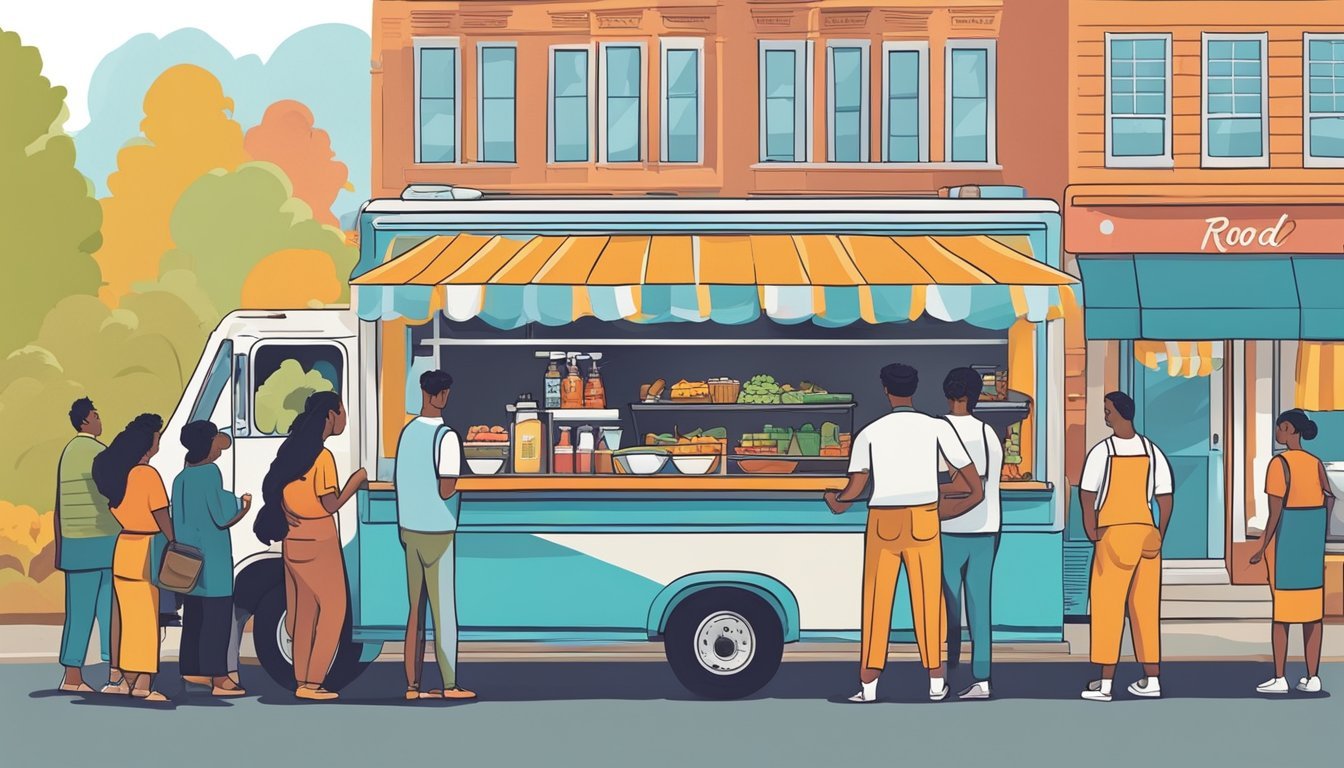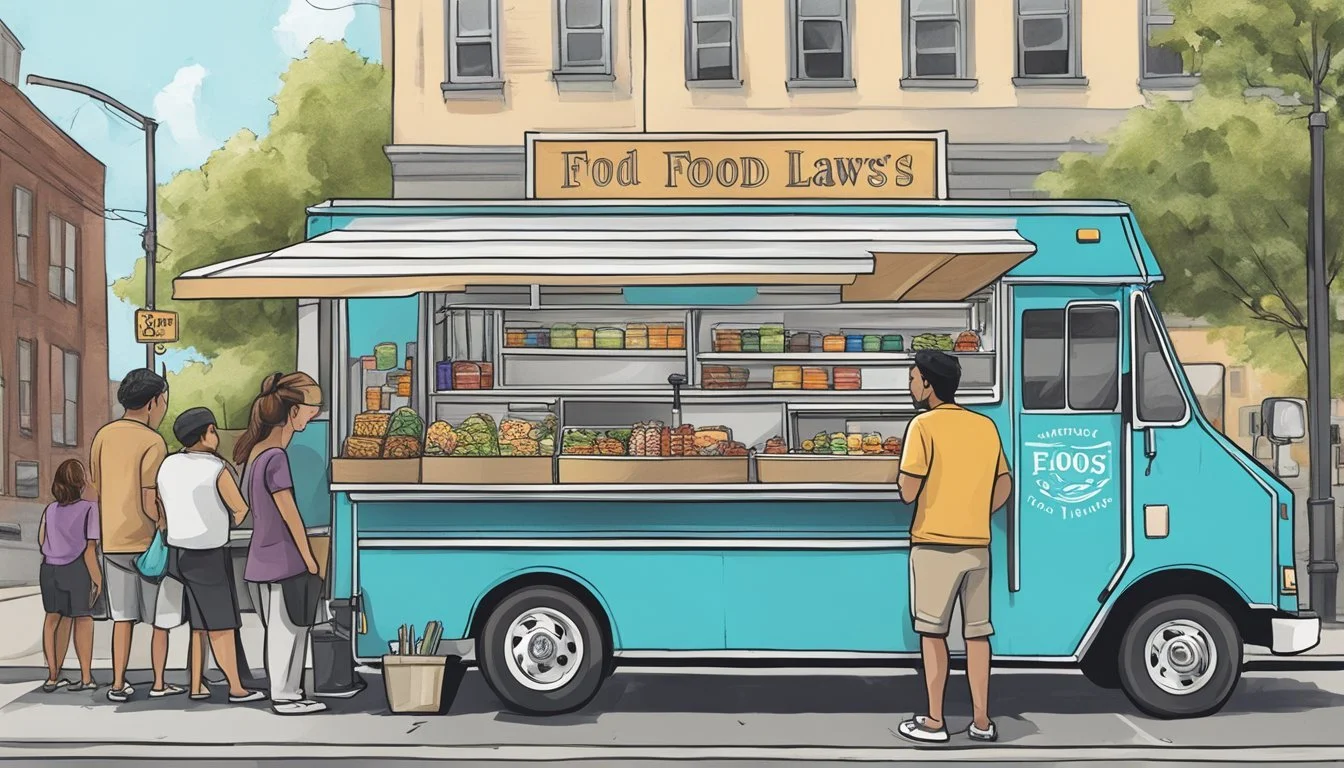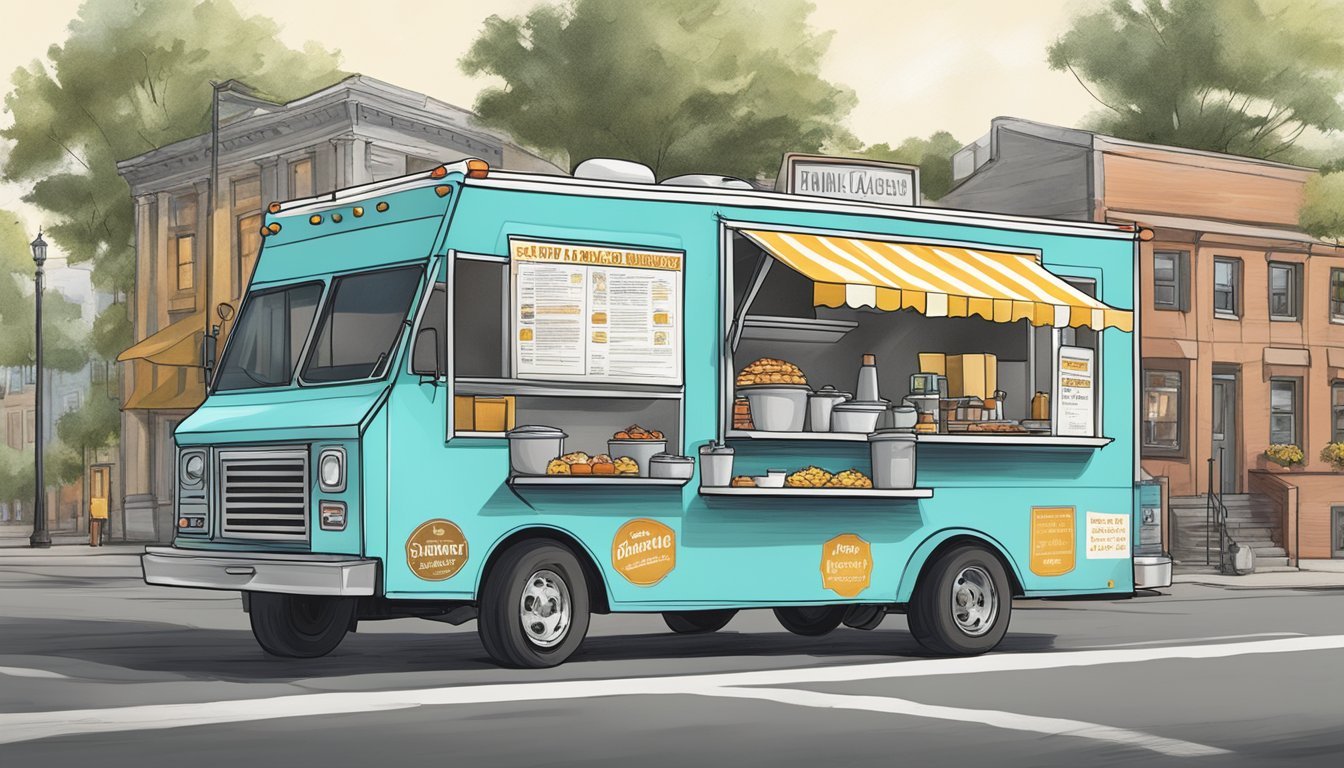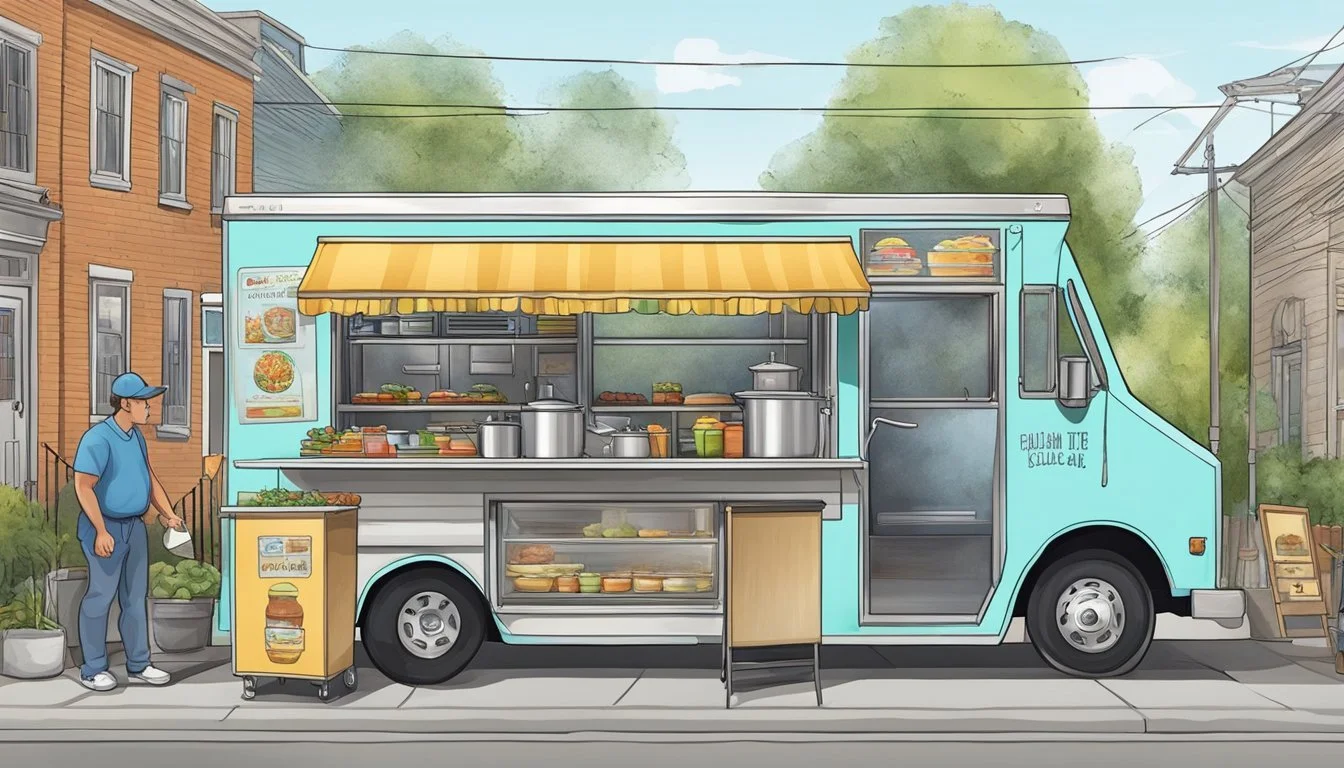Food Truck Laws in Rhode Island
Navigating Regulations for Mobile Vendors
Food truck laws in Rhode Island are designed to regulate the operation of mobile food establishments (MFEs) across the state. The regulations cover various aspects of food truck operation, including health and safety standards, licensing, and permits required to legally conduct business. Prospective and current food truck operators must navigate a combination of state-level regulations and local municipality requirements to ensure they are in full compliance.
In Rhode Island, the process of starting and registering a food truck business involves obtaining a state registration and adhering to guidelines that prohibit certain activities, such as the sale of alcoholic beverages without proper authorization. The state necessitates that all mobile food establishments comply with the Rhode Island Fire Safety Code, which outlines the safety measures required to protect public health and prevent accidents or emergencies.
Additionally, the food truck industry in Rhode Island requires operators to renew their state-level MFE registrations and municipal permits regularly to avoid interruptions in their service. Each food truck is responsible for understanding and following the schedule for renewals, as well as being aware of any changes in the law that might affect their operation. Through the appropriate channels, food truck owners can access information and resources to assist them with legal compliance, thereby ensuring a vibrant and thriving mobile food industry in Rhode Island.
Establishing a Food Truck Business
When setting up a food truck business in Rhode Island, entrepreneurs must navigate a series of legal steps to ensure their venture is compliant with state regulations. These steps involve choosing the right business structure, registering with the appropriate authorities, and securing an Employer Identification Number (EIN).
Choosing a Business Structure
The choice of a business structure is crucial as it impacts taxes, liability, and ongoing compliance requirements. Food trucks in Rhode Island can operate as a sole proprietorship, partnership, or corporation. A sole proprietorship is a simple structure without the need for formal registration, but it offers no personal liability protection. For multiple owners, a partnership shares profits and responsibilities, but also exposes each partner to full liability for the business's debts. Alternatively, a corporation, usually an S-corp or a C-corp for food trucks, provides liability protection and potential tax benefits but requires more extensive record-keeping and reporting.
Registering the Business Entity
After selecting a business structure, registering the business with the Rhode Island Secretary of State is the next step. This ensures the business name is unique and avoids legal issues with trademark infringement. For food trucks, the state may require additional registration steps, depending on the specific municipal requirements. Registration requires submitting necessary forms, an address for the business, and potentially details about the owners and their responsibilities.
Obtaining an Employer Identification Number (EIN)
An EIN, provided by the Internal Revenue Service (IRS), is mandatory for food trucks operating as anything other than a sole proprietorship without employees. This federal tax ID is necessary for tax reporting, hiring employees, and opening a business bank account. Food truck businesses can apply for an EIN through the IRS website or by mail or fax, providing their business structure details and the personal information of the principal officer, owner, or partner.
Licensing and Permits
In Rhode Island, operating a food truck requires careful adherence to state and municipal regulations, including obtaining the appropriate licenses and permits. Each has its role in capitalizing on food service opportunities while ensuring public safety and compliance.
State Food Service License
A State Food Service License is mandatory for all food service establishments, including mobile food services. Issued by the Rhode Island Department of Health, this license confirms that the establishment complies with health and safety standards. Every mobile food establishment (MFE) must secure this license, even those with a license from their home state if from outside Rhode Island. Applications are reviewed for adherence to the state's health regulations.
Mobile Food Establishments (MFE) Registration
Food trucks are classified under Mobile Food Establishments (MFE) and must be registered with the Department of Business Regulation. This MFE Registration requires applicants to provide information about their operation, and to pay the associated fees. Regulation 230-RICR-30-35-1 guides the process, ensuring that all food trucks meet state requirements. The regulator reviews both new and renewal applications for completeness and compliance.
Municipal Permits and Regulations
Apart from state requirements, food trucks also need to navigate municipal permits and regulations, which vary by locality within the state. Typically, municipalities require a municipal permit in addition to the state-issued licenses, to control the number and location of food trucks. These regulations are designed to ensure public safety, manage traffic, and prevent conflicts with local businesses. Every food truck operator must check with the local municipality to ensure all local requirements are met.
Insurance and Safety Compliance
Operators of food trucks in Rhode Island must navigate several regulations to ensure their businesses are properly insured and comply with safety standards. These measures are put in place to protect not only the business and its employees but also the consumers and general public.
Commercial Liability Insurance
Commercial liability insurance is crucial for food trucks in Rhode Island. This insurance safeguards the business against claims related to property damage and bodily injuries that might occur on-site. Rhode Island’s mobile food establishments are required to hold valid insurance, which can include coverage specific to watercraft if the food truck also operates on water Food Establishment Insurance Requirements in Rhode Island.
Vehicle and Fire Safety Inspections
Food truck operators must ensure their vehicle complies with the Rhode Island Fire Safety Code. The state mandates that food trucks undergo regular inspections to keep the vehicle and its customers safe. Systems like fire suppression systems are often reviewed to confirm they are in working order. Adequate space must be left at events to allow access for fire department trucks and rescue vehicles in case of emergency State Registration of Mobile Food Establishments - Rhode Island.
Complying with Food Safety Requirements
The Center for Food Protection and the Rhode Island Department of Health outline specific food safety requirements for mobile food establishments. Holding a valid Mobile Food Service License requires food trucks to meet these standards, which covers proper food handling practices and regular health and safety inspections. Regulation ensures that food truck operations do not become a source of foodborne illnesses Mobile Food Establishments (Food Trucks) Frequently Asked Questions.
Financial Matters
In Rhode Island, food truck operators must navigate the complexities of managing sales tax and various fees related to their business. Attention to these financial aspects is crucial for legal operation and financial success.
Handling Sales Tax
In Rhode Island, all sales from a food truck are subject to state sales tax, which necessitates obtaining a Retail Sales Permit from the Division of Taxation. Operators must regularly collect, report, and remit sales tax. The General Treasurer oversees sales tax collections, which are critical for business compliance. To ensure proper handling of sales tax, operators should:
Apply for a Retail Sales Permit from the Division of Taxation.
Collect the correct amount of sales tax at the current rate.
Maintain accurate records of all sales and taxes collected.
File sales tax returns and payments by the due dates.
Understanding Fees and Penalties
The operation of a mobile food establishment (MFE) entails various fees and penalties for non-compliance. These are set and governed by the State of Rhode Island and may include:
Initial application fees for state registration.
Renewal fees for maintaining an active MFE registration.
Penalties imposed for late renewals or failure to comply with regulations.
Food truck owners must be diligent about meeting all deadlines to avoid penalties which can impact their business operation. Here are the steps to follow:
Review and understand all applicable fees for state registration and local permits.
Budget for these expenses in the food truck’s financial plan.
Adhere to all deadlines for registration renewals and permit applications.
Stay informed on any changes in fees or penalty structures by checking updates from the Rhode Island Department of Business Regulation.
By staying informed and proactive in financial matters such as sales tax collection and fee management, food truck operators in Rhode Island can ensure they remain in good standing with state regulations.
Running the Food Truck
In Rhode Island, food truck operators must navigate state and local regulations thoughtfully, with particular attention paid to choice of locations, menu composition, and event participation.
Selecting Locations and Venues
Food trucks in Rhode Island should carefully consider their location to optimize visibility and sales. In Providence, the state’s capital, high foot traffic areas such as Kennedy Plaza or near college campuses can be prime spots. They must comply with local ordinances, such as those specified by the Rhode Island Commerce Corporation, regarding where a mobile food business may operate. It is essential to renew municipal permits and the State Registration annually to keep sites legal.
Menu Planning and Ingredients
Crafting a menu requires a strategic approach to both ingredients and customer preferences. A successful food truck menu balances consistency with novelty, integrating fresh, local produce where possible. Food trucks in Rhode Island, being part of a coastal state, often benefit from utilizing seafood in their offerings. Menu items must adhere to safety and food preparation regulations in Rhode Island, and operators must ensure that their vehicles are ready to prepare and serve food within these guidelines.
Operating During Special Events
Participating in special events, like festivals or farmers' markets, requires careful planning. Operators should secure necessary temporary event permits and familiarize themselves with specific rules that govern mobile food establishments during these events, which are noted in the State of Rhode Island regulations. During special events, the menu may need to be adjusted to cater to the theme and crowd specifics, ensuring the food truck can maximize its presence and benefit from increased pedestrian traffic.
Adhering to Local Ordinances
Food truck owners in Rhode Island must navigate a complex landscape of local ordinances that dictate where and how they can operate. These laws ensure public safety and compliance with health standards.
Following Municipal Ordinances
Each municipality in Rhode Island has its own set of ordinances that regulate food truck operations. These can include restrictions on locations and hours of operation. To legally operate, food truck owners must adhere to these municipal regulations, which can vary greatly from one town to another. It is essential for food truck entrepreneurs to consult with local government offices to obtain the correct permits.
Alcohol Regulations and Permits
If a food truck owner chooses to serve alcoholic beverages, they must comply with additional regulations and obtain a separate permit. Rhode Island’s Department of Business Regulation oversees these permits, and failure to obtain one could result in legal repercussions. Vendors must ensure they meet all the necessary requirements which include age verification and serving limits.
Propane and Fire Safety Regulations
Propane use in food trucks is subject to strict safety standards due to the potential fire hazard. Food truck operators must follow guidelines for the storage and use of propane tanks, and they are required to have fire safety equipment on board. These regulations are enforced to minimize the risk of accidents and ensure the safety of both the food truck staff and their customers. Regular inspections may be conducted by the fire department to ensure compliance with the fire safety regulations.
End of Day Procedures
Following proper end of day procedures is essential for food truck operators to maintain compliance with Rhode Island regulations and ensure food safety. It involves thorough cleaning, inventory assessment, and preparation for inspections.
Cleaning and Maintenance
At the end of each day, food trucks must undergo a comprehensive cleaning to prevent contamination and adhere to food safety protocols. Surfaces that come into contact with food should be sanitized, while cooking equipment must be cleaned as per the manufacturers' guidelines. Waste disposal should follow the State Registration of Mobile Food Establishments - Rhode Island regulations to avoid fines or penalties during unexpected inspections.
Interior Cleaning Checklist:
Disinfect countertops and cooking areas.
Clean cooking equipment and utensils.
Mop floors and wipe down walls.
Exterior Maintenance:
Secure all openings and storage to deter pests.
Check for any wear that could compromise food safety.
Inventory and Stock Assessment
They must also perform an inventory and stock assessment to track supplies and ensure a fresh offering for the next business day. This includes checking expiration dates and maintaining proper storage conditions to comply with the Rhode Island Food Code. This assessment helps to minimize waste and ensures that the food truck is ready for operation and for any potential health inspections.
Inventory Tracking Table:
Beef Patties
Quantity: 20
Expiration Date: 03/10/2024
Notes: Stored at 0°F
Lettuce Heads
Quantity: 10
Expiration Date: 03/09/2024
Notes: Keep refrigerated
Specialty Sauce
Quantity: 5 gallons
Expiration Date: 03/15/2024
Notes: Mix before use
In performing these end of day procedures, food truck operators in Rhode Island will ensure their establishment is clean, well maintained, and stocked, reducing the risk of foodborne illnesses and ensuring compliance with state laws.
Marketing and Promotion
Marketing and promotion are critical for the success of food trucks in Rhode Island. Establishing an online presence and actively participating in community events can significantly increase visibility and attract a loyal customer base.
Developing an Online Presence
For a food truck, creating a strong online presence is a way to showcase its unique menu and brand personality. This includes a professional website—often a central platform where potential customers can discover the truck's location schedule, menu offerings, and any special promotions. Social media platforms like Instagram and Facebook are also crucial. They serve as interactive hubs where food trucks can post updates, engage with the community, and even handle customer service inquiries.
Website Must-Haves:
Location Schedule: A weekly update of where the truck will be.
Menu Details: Clear, appetizing images of food items and descriptions.
Contact Information: How to reach the food truck for bookings or questions.
Social Media Tips:
Post high-quality photos of food and events.
Use hashtags relevant to Rhode Island foodies and local happenings.
Engage with customers through comments and stories.
Participation in Community Events
A food truck's involvement in Rhode Island's community events can cultivate a following and foster repeated business. Participation in local markets, festivals, and other public gatherings allows food trucks to interact directly with their audience. Collaboration with other local businesses for cross-promotion or hosting themed nights can amplify their reach and appeal to larger segments of the community.
Community Engagement Strategies:
Event Calendar: Maintain a calendar on the food truck's website to inform customers of upcoming events.
Local Partnerships: Partner with event organizers for mutual promotion.
Special Menus: Offer event-specific menu items to create buzz and stand out.









